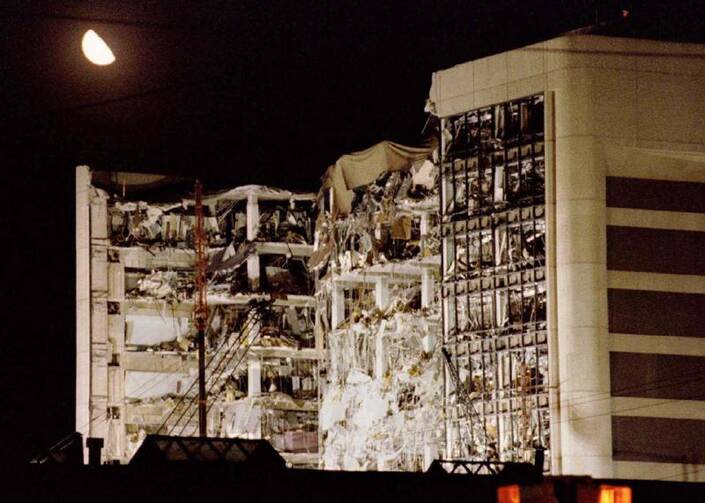OKLAHOMA CITY (CNS) -- The nation will never forget "the 168 innocent lives taken, including 19 children," in the bombing of the Alfred P. Murrah Federal Building in Oklahoma City April 19, 1995, said Archbishop Paul S. Coakley.
"These were our family members, our friends, co-workers and neighbors. We are grateful for their lives and we will never forget their sacrifice," the archbishop said. "We also remember three unborn children who perished that day."
"The evil that visited our city 25 years ago sought to strike fear in our hearts and destroy our way of life," the head of the Archdiocese of Oklahoma City said in an April 16 statement.
"But we are a resilient community, a people of faith, who overcame evil with goodness. We refuse to be conquered by hatred," he said. "We remain grateful for the first responders and all those who rushed in to assist us that day and in the months following. We are grateful for the faith that has sustained us and the generosity of so many who have supported us."
Archbishop Coakley celebrated a noon Mass April 17 at St. Joseph Old Cathedral in downtown Oklahoma City to commemorate the 25th anniversary of the bombing. The cathedral sits across the street from the Oklahoma City National Memorial and Museum.
The Mass was livestreamed at archokc.org/live and on Facebook Live.
Until the 9/11 terrorist attacks, the 1995 bombing was the deadliest terrorist attack in the history of the United States. It remains the deadliest incident of domestic terrorism in the country's history.
The blast destroyed or damaged 324 other buildings within a 16-block radius, shattered glass in 258 nearby buildings, and destroyed or burned 86 cars, causing an estimated $652 million worth of damage. Local, state, federal and worldwide agencies engaged in extensive rescue efforts in the wake of the bombing, and substantial donations were received from across the country.
The Federal Emergency Management Agency activated 11 of its task forces, consisting of 665 rescue workers who assisted in rescue and recovery operations.
Timothy McVeigh, 33, was arrested and charged with setting off the blast. He was found guilty and sentenced to death. He was executed in 2001. His friend Terry Nichols, 40, was arrested and charged as his co-conspirator. He was found guilty and sentenced to life in prison.
In his statement, Archbishop Coakley referenced Divine Mercy Sunday, April 19, a day when "we celebrate God’s love and tender mercy."
"When we experience darkness and loss, Jesus shelters us and gives us hope. He accompanies us as we forge our path forward toward healing and peace," he said. "During Poland’s dark days preceding the Second World War, Jesus promised St. Faustina that his Divine Mercy would never abandon those who trust in him. He promised this gift especially at the hour of death for those who turn to him."
"We pray that our city will continue to be a beacon of hope, healing and reconciliation for all people," Archbishop Coakley continued. "We pray that the Oklahoma Standard, and our faith and care for one another will keep us strong, especially during this time of pandemic.
"The Oklahoma Standard' was born from the aftermath of the April 19, 1995, became known throughout the world. It means "resilience in the face of adversity" and "a strength and compassion that will not be defeated."
Archbishop Coakley concluded his statement with this: "Lord, we pray that violence and hatred will never rule our hearts but will always be overcome by mercy, forgiveness and compassion. Amen."










